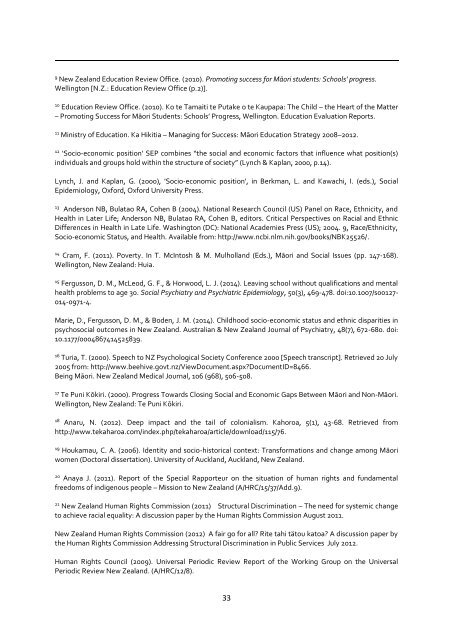UNCONSCIOUS BIAS AND EDUCATION
unconsious-bias-and-education
unconsious-bias-and-education
You also want an ePaper? Increase the reach of your titles
YUMPU automatically turns print PDFs into web optimized ePapers that Google loves.
9<br />
New Zealand Education Review Office. (2010). Promoting success for Māori students: Schools' progress.<br />
Wellington [N.Z.: Education Review Office (p.2)].<br />
10<br />
Education Review Office. (2010). Ko te Tamaiti te Putake o te Kaupapa: The Child – the Heart of the Matter<br />
– Promoting Success for Māori Students: Schools’ Progress, Wellington. Education Evaluation Reports.<br />
11<br />
Ministry of Education. Ka Hikitia – Managing for Success: Māori Education Strategy 2008–2012.<br />
12<br />
‘Socio-economic position’ SEP combines “the social and economic factors that influence what position(s)<br />
individuals and groups hold within the structure of society” (Lynch & Kaplan, 2000, p.14).<br />
Lynch, J. and Kaplan, G. (2000), 'Socio-economic position', in Berkman, L. and Kawachi, I. (eds.), Social<br />
Epidemiology, Oxford, Oxford University Press.<br />
13<br />
Anderson NB, Bulatao RA, Cohen B (2004). National Research Council (US) Panel on Race, Ethnicity, and<br />
Health in Later Life; Anderson NB, Bulatao RA, Cohen B, editors. Critical Perspectives on Racial and Ethnic<br />
Differences in Health in Late Life. Washington (DC): National Academies Press (US); 2004. 9, Race/Ethnicity,<br />
Socio-economic Status, and Health. Available from: http://www.ncbi.nlm.nih.gov/books/NBK25526/.<br />
14<br />
Cram, F. (2011). Poverty. In T. McIntosh & M. Mulholland (Eds.), Māori and Social Issues (pp. 147-168).<br />
Wellington, New Zealand: Huia.<br />
15<br />
Fergusson, D. M., McLeod, G. F., & Horwood, L. J. (2014). Leaving school without qualifications and mental<br />
health problems to age 30. Social Psychiatry and Psychiatric Epidemiology, 50(3), 469-478. doi:10.1007/s00127-<br />
014-0971-4.<br />
Marie, D., Fergusson, D. M., & Boden, J. M. (2014). Childhood socio-economic status and ethnic disparities in<br />
psychosocial outcomes in New Zealand. Australian & New Zealand Journal of Psychiatry, 48(7), 672-680. doi:<br />
10.1177/0004867414525839.<br />
16<br />
Turia, T. (2000). Speech to NZ Psychological Society Conference 2000 [Speech transcript]. Retrieved 20 July<br />
2005 from: http://www.beehive.govt.nz/ViewDocument.aspx?DocumentID=8466.<br />
Being Māori. New Zealand Medical Journal, 106 (968), 506-508.<br />
17<br />
Te Puni Kōkiri. (2000). Progress Towards Closing Social and Economic Gaps Between Māori and Non-Māori.<br />
Wellington, New Zealand: Te Puni Kōkiri.<br />
18<br />
Anaru, N. (2012). Deep impact and the tail of colonialism. Kahoroa, 5(1), 43-68. Retrieved from<br />
http://www.tekaharoa.com/index.php/tekaharoa/article/download/115/76.<br />
19<br />
Houkamau, C. A. (2006). Identity and socio-historical context: Transformations and change among Māori<br />
women (Doctoral dissertation). University of Auckland, Auckland, New Zealand.<br />
20<br />
Anaya J. (2011). Report of the Special Rapporteur on the situation of human rights and fundamental<br />
freedoms of indigenous people – Mission to New Zealand (A/HRC/15/37/Add.9).<br />
21<br />
New Zealand Human Rights Commission (2011) Structural Discrimination – The need for systemic change<br />
to achieve racial equality: A discussion paper by the Human Rights Commission August 2011.<br />
New Zealand Human Rights Commission (2012) A fair go for all? Rite tahi tätou katoa? A discussion paper by<br />
the Human Rights Commission Addressing Structural Discrimination in Public Services July 2012.<br />
Human Rights Council (2009). Universal Periodic Review Report of the Working Group on the Universal<br />
Periodic Review New Zealand. (A/HRC/12/8).<br />
33


